They're not "just jokes," and you're not being too sensitive
The truth is that anti-woke comedy just isn't funny. Here's why:
This is the always free, reader-supported weekend edition of The Experiment, your official hopepunk newsletter. If you’d like to support my work, become a paid subscriber or check out the options below. But even if you don’t, this bugga free. Thanks for reading!
Stanford’s First Law of Words and Stuff is that any modifier in a name reduces the likelihood that the modifier accurately describes the thing being modified. Call something classy, or sexy, or deluxe, and you can be reasonably assured that the thing in question is not classy, sexy, or deluxe. A great example of this happened in Los Angeles last month. It was called “A Night of Laughter with Robert F. Kennedy, Jr. and Friends, featuring Cheryl Hines.” The event did take place at night and, in fact included those mentioned, but whether this was a night “of laughter” bears investigation, because, as the Los Angeles Times put it, “Was it actually funny? Not particularly.”
Hines, RFK Jr.’s wife most famous for playing Larry David’s ex-wife on Curb Your Enthusiasm, emceed the show. David, who introduced Hines to RFK Jr., was not there, nor were any of the better-known actors from the HBO comedy. In their place was a who’s who of has-beens.
Podcaster Adam Carolla referenced the “Iraqi guy” who threw his shoes at President George W. Bush in 2008 and “joked about pro-Trump election denier Mike Lindell suffocating Biden with a MyPillow,” reported the Washington Post.
Mike Binder said things about women, Jews, “little people,” “African American Blacks” and “all the gays.” He said Kennedy was “married I think to one of the funniest women in the Western world: Eddie Izzard,” called his children “the woking dead,” called his daughter “a sturdy little lesbian,” and referred to his son using a gay slur. “Yes I used the word, call the police.”
“Does it make me a bad guy if …?”
Binder, who introduced many of his jokes by saying, “Does it make me a bad guy if …?” combined homophobia and racism with this: “He would be here tonight, but this is a fundraiser, and we didn’t want to spend the money on the operation to have Larry David surgically removed from Barack Obama’s ass. What — am I wrong?! Give the band a round of applause.”
Jeremy Piven from HBO’s Entourage joked that they couldn’t make that show nowadays “because a show about four white guys now would be mistaken for Jan. 6 insurrection footage,” wrote the Times. Piven got something close to a joke in comparing the lot of white men to Bitcoin, saying, “We were the toast of the town, and now everyone’s trying to dump us.”
Schneider held up his Latina wife to justify joking about Mexicans and cribbed the pro-choice motto to turn a diatribe against COVID-19 vaccines into something like a joke. “Over Half of the US population is continuing to say no to this unapproved experimental gene therapy! ‘My body, my choice!'” he said.
Schneider had a lot to say about trans kids in California public schools, joking, kinda, when he said, “One day you drop off a girl, and in the afternoon you pick up a boy.” About Disneyland, he said, “For every adult that buys a ticket, they get a free puberty blocker.”
“That wasn’t really a joke was it?”
Schneider also had a lot to say about the pandemic, especially the mask mandates that one might have thought advantageous to someone of his visage1 but that he apparently perceived of as overly cumbersome.
“I’m old enough to remember when the Democratic Party was the democratic party. Remember when they were against war, censorship, don’t trust your government?” he asked. “That wasn’t really a joke was it?”
No, not really, but according to multiple reports—no one was allowed to record the event—the crowd seemed to like it. First I read one article about this and then hunted up all the others. They all seemed in agreement about what transpired. None could explain to me why anyone thought any of it was funny.
This is the kind of thing that Jesse David Fox thinks about a lot. He hosts Good One: A Podcast About Jokes and wrote Comedy Book: How Comedy Conquered Culture—And the Magic That Makes It Work. His thesis is that standup comedy has become an art form, and if anyone could explain what the hell went on at “A Night of Laughter,” it’d be him. So I read Comedy Book, hoping for answers.
One theory the book offered up was Superiority theory, which Fox writes “dates back to the likes of Plato and Aristotle (though the name wouldn’t come until the twentieth century), and argues we laugh at other’s misfortune because it makes us feel better about ourselves.” But Carolla wasn’t laughing at Biden for slipping on a verbal banana peel. He got huge laughs for suggesting the Pillow Guy murder him.
Perhaps a better analogue to Kennedy’s fundraiser were minstrel shows, which Fox writes were “designed to appeal to the twisted morality of its racist audience members, resulting in comedy that was degrading and dehumanizing.” Fox calls what happened onstage in Los Angeles “non-ironic sexism” and similar to the “id-driven and regressive” comedy we saw post-9/11.
“non-ironic sexism”
The point of this anti-mask, anti-queer, anti-woman comedy is to “separat[e] out some people from a social bond among those laughing at them,” according to film professor Philip Scepanski, who Fox cites in Comedy Book. Referencing Sigmund Freud and Henri Bergson, Scepanski writes that “the tendency of jokes to be at the expense of some, separating humor’s targets from the more unified community” fulfills a deep psychological need.
This is why “Let’s go Brandon” passes for funny nowadays and, more to the point, why George Carlin compared Andrew Dice Clay’s shows to fascist rallies. “If you are saying supposedly offensive things and the audience is instantly all on board, it isn’t a comedy show, it’s a rally,” writes Fox.
OK, that makes more sense. What happened at “A Night of Laughter”2 was more akin to an airing of grievances at a rally than to a comedy show. But that doesn’t explain Shane Gillis’ turn as host of Saturday Night Live a couple weeks ago. Supposedly Gillis is the most-popular rightwing comedian in the United States, but on comedy’s most-coveted stage, he bombed so hard Biden called Lorne Michaels to urge a cease fire.3
If you don’t know Gillis from the guy standing in front of you at Starbucks, let me catch you up. A couple years ago, he was hired to join the cast of SNL and then fired before his first show. It seems no one had bothered to listen to his podcast, “Matt and Shane's Secret Podcast,” on which he’d used words like “Chink” and “faggot.” The fact that the other comedian SNL hired at that time was an Asian homosexual made all of this just a bit awkward.
A funny thing happened on the way to Gillis being cancelled. Getting fired by the cultural elite for racism is great branding these days for conservatives. Gillis’ podcast became the top Patreon account in the world, making him six figures every month. Michaels, who cast Donald Trump as host during the 2016 campaign, undoubtedly wanted a piece of that action and invited Gillis back, this time not as a cast member but as host.
“It’s, uh—yeah, I’m here.”
Media writer Tom Jones of The Poynter Report thought this would make for great TV. Tom Jones was wrong.
I settled in for a monologue that could have been one of the most memorable in the show’s 49 seasons. But it never happened. When it came to Gillis’ firing and what led to it, there were no jokes, no apology, not even doubling down and making fun of “SNL.” The self-proclaimed risk-taking comedian wasn’t risky or interesting at all. Instead, Gillis went on to essentially bomb in front of the live audience, giving a cringeworthy monologue that included jokes about gay people and Down syndrome.
“Thank you very much,” he said. “It’s, uh—yeah, I’m here.”
He joked, sort of, about how a young boy’s love for their mother makes them gay, but not homosexual.
“Do you remember when you were just a gay little boy? Every little boy is just their mom’s gay best friend.”
“I can see everyone not enjoying it.”
He joked, sort of, about how people with Downs syndrome are advantaged.
“They’re the only ones having a good time pretty consistently. They’re not worried about the election.”
The audience was not going there with him.
“Look, I don’t have any material that can be on TV, all right? I’m trying my best. Also, this place is extremely well-lit. I can see everyone not enjoying it. This is the most nervous I’ve ever been.”
To Jeremy Gordon of The Atlantic, the problem was that the audience wasn’t granting him the good faith than more conservative audiences do.
“Yet for some people, it’s just funny to hear the words gay and retarded. This is part of why Gillis is allusively described as a comedian who appeals to red-state voters". … In general, Gillis’s comedy benefits from his ability to immediately contradict himself, whether rhetorically or expressively—he may have just said something offensive, but of course he doesn’t mean it like that, and your laughter is a benchmark of whether or not you believe him.”
Gillis, too, blamed the audience. When another joke didn’t work, Gillis said, “I thought that was going to get a bigger laugh. I thought we were allowed to have fun here.”
A word, Mr. Gillis. I’m not terribly offended about what you joked about. I’m damned offended, though, that you were gifted perhaps comedy’s greatest stage and didn’t think a nanosecond about whether this audience trusted you to joke about those things in good faith or for that matter how to make them laugh about anything.
“I thought we were allowed to have fun here.”
In Comedy Book, Fox calls this brand of humor “aggressive, reactionary bravado … rooted in a conservative revulsion against the push toward multiculturalism … that valued personal expression over how other people might respond.”
Gillis’ fans celebrated his appearance on SNL as a victory in the war on woke. Fox would urge these fans to get a little perspective.
“[T]oday, the people today who say they can’t say anything anymore are often found saying it during a performance they earned tens of thousands of dollars for, on their podcast they make hundreds of thousands of dollars for, or the special they got paid millions for. Unlike Carlin, unlike Pryor, you know where they aren’t saying it? A jail cell.”
Sadly, though, Gillis’ appearance means something more ominous to me. Gillis was given that stage not because he had apologized for trading in racism but because the pro-racism audience has become profitable. Fox touches on the common saying that SNL isn’t as good as it used to be before pushing back, writing, “It is our culture’s great reflector. … When the culture sucks, SNL will suck.”
I’m not sure I want to look at our country in the mirror these days, now that you mention it.
Which brings us back to Jon Stewart. Some of you pushed back on last weekend’s essay, saying I couldn’t say that Biden’s age wasn’t an issue, that Stewart isn’t and shouldn’t be considered a journalist, and that what Fox News is doing should not be considered both-sidesism4. Others wrote to say that they loved the essay and agreed with every word. To them, I congratulate them on their discernment.
But this gives me a reason to come back at Jon Stewart’s big miss in his return to The Daily Show. Comedy Book spends a lot of time on his first, genre-shaping turn as host of The Daily Show, crediting him with establishing “comedians’ status in the sociopolitical conversation,” writes Fox. “[T]he media has imbued comedians … with the status previously granted only to those who claim to be telling us the truth—journalists, politicians, and other public intellectuals.”
“Trauma is a toxin that comedy, as society’s liver, is helping to process,” he writes. Fox contends that by infusing the form and aesthetic of cable news with “the language of comedy, … rooting comedy in realism and anger,” Stewart spoke truth to power not to change the powerful but to comfort his afflicted audience. New Yorker’s Emily Nussbaum put it better: “The Daily Show became a gathering place for the disenchanted—a place that let viewers know they weren’t crazy.”
“Trauma is a toxin that comedy, as society’s liver, is helping to process.”
There’s nothing wrong with playing to your audience. Comedians have always played to friendly crowds. Lenny Bruce played in jazz clubs, not VFW halls. Joan Rivers performed in front of gay men. Stewart did the fake news on Comedy Central to an audience that never for a second had to endure the crazy-making thought that the President might be a Russian asset.
Most importantly of all, Stewart never came across like a partisan hack. Instead, he was our Walter Cronkite, the one we could trust to base his bits on reliable, agreed-upon truth. “Without credibility, the jokes mean nothing,” said Adam Chodikoff, The Daily Show’s head researcher. This is a comedy show so committed to keeping the audience’s trust that they had to rank their researchers.
And then, in February 2015, he left us, at which point crazy went gangbusters. There were, Fox writes, “so, so many tweets from comedy writers trying to be journalists and journalists trying to be comedy writers.” With Trump asking the Department of Justice and the FCC whether he could punish SNL for making fun of him, the entire context of political satire changed under Trump. See also: John Mulaney.
Here’s how I try to look at it, and this is just me, this guy being the president, it’s like there’s a horse loose in a hospital. It’s like there’s a horse loose in a hospital. I think eventually everything’s going to be okay, but I have no idea what’s going to happen next. And neither do any of you, and neither do your parents, because there’s a horse loose in the hospital. It’s never happened before, no one knows what the horse is going to do next, least of all the horse. He’s never been in a hospital before, he’s as confused as you are.
“The value of feeling not alone and not crazy intensified under Trump,” writes Fox. “Before Jon Stewart, satire was what closes on Saturday night, as the popular saying went. But after Donald Trump, satire was open 24/7.”
At the same time, the news media structures that Stewart copied before fractured, and the language of comedy evolved, giving audiences Nanette, Inside, and 8:46. “What is comedy?” became a serious question without an easy answer when we needed comedians most.
“You might come to a comedian for answers, but certainty is not a realistic expectation,” writes Fox. “Months after the election of Donald Trump, it was more honest not to know.”
“The value of feeling not alone and not crazy intensified under Trump.”
That’s why Stewart’s return to The Daily Show was so upsetting. I have friends who have Go Bags. My wife has fielded several calls from friends asking for advice on how to get abortions. Things are not OK, and Stewart’s audience does not feel safe. Stewart’s initial bit about both Biden and Trump being old meant that we couldn’t trust Stewart any longer to process the insanity. The “they’re both old” is the kind of facile, shopworn BS he would have torn apart in the old days, and his his defensive, self-pitying lashing out the following week was straight-up gas lighting.
“I mean … we’re just talking here! It was just one fucking show! It was 20 minutes! I did 20 minutes in one fucking show! But I guess as the famous saying goes: ‘Democracy dies in discussion.’ But look: I have sinned against you, I’m sorry. It was never my intention to say out loud what I saw with my eyes and then brain.”
This is what it looks like when a comedian doesn’t listen to their audience,” writes Fox.
Comedians are supposed to find the line and then cross it with deliberation. It’s become a tired response from comedians who trip and fall on their faces while crossing that line that we’re being overly sensitive. “They’re just jokes,” we’re told.
“They’re ‘just jokes’? Get bent, man. Personally, I have found jokes a salve and means of processing an at-times too tragic world,” writes Fox. “If people on a given night aren’t laughing it’s not because they are too sensitive. It is because they do not trust you.”
Just like SNL, comedy is a reflection of our culture, and like the SNL studio, it’s “extremely well-lit.” There is no subtlty as to what is going on, and like Gillis, “I can see everyone not enjoying it.”
This time in history is too cruel, too scary, and to aggressively stupid not to have better comedy. The audience deserves better from Jon Stewart and from SNL, though in fairness I’m not sure the same can be said of Rob Schneider. If the audience is going to have to live through 2024, the comedians better step up their game, and soon.
Jason Stanford is a co-author of NYT-best selling Forget the Alamo: The Rise and Fall of an American Myth. His bylines have appeared in the Washington Post, Time, and Texas Monthly, among others. Follow him on Threads at @jasonstanford, or email him at jason31170@gmail.com.
Further Reading
We set up a merch table in the back where you can get T-shirts, coffee mugs, and even tote bags now. Show the world that you’re part of The Experiment.
We’ve also got a tip jar, and I promise to waste every cent you give me on having fun, because writing this newsletter for you is how I have fun.
Buy the book Texas Lt. Gov. Dan Patrick banned from the Bullock Texas History Museum: Forget the Alamo: The Rise and Fall of the American Myth by Bryan Burrough, Chris Tomlinson, and myself is out from Penguin Random House. The New York Times bestseller is out in paperback now!
Now that’s funny.
“A Night of Laughter” started out sweaty and try-hard, quickly became cringe, and now is starting to make me laugh.
Not just funny, but topical.
I never said his age wasn’t a real issue, just that it should not be given equal weight to Trump’s historically elephantine problems and fascist policies. Neither did I say that Jon Stewart should be considered a journalist, merely that the blowback he was getting was instructive to understand the problems of both-sidesism in the news media. The point about Fox News was well-taken. Good job, E.S.




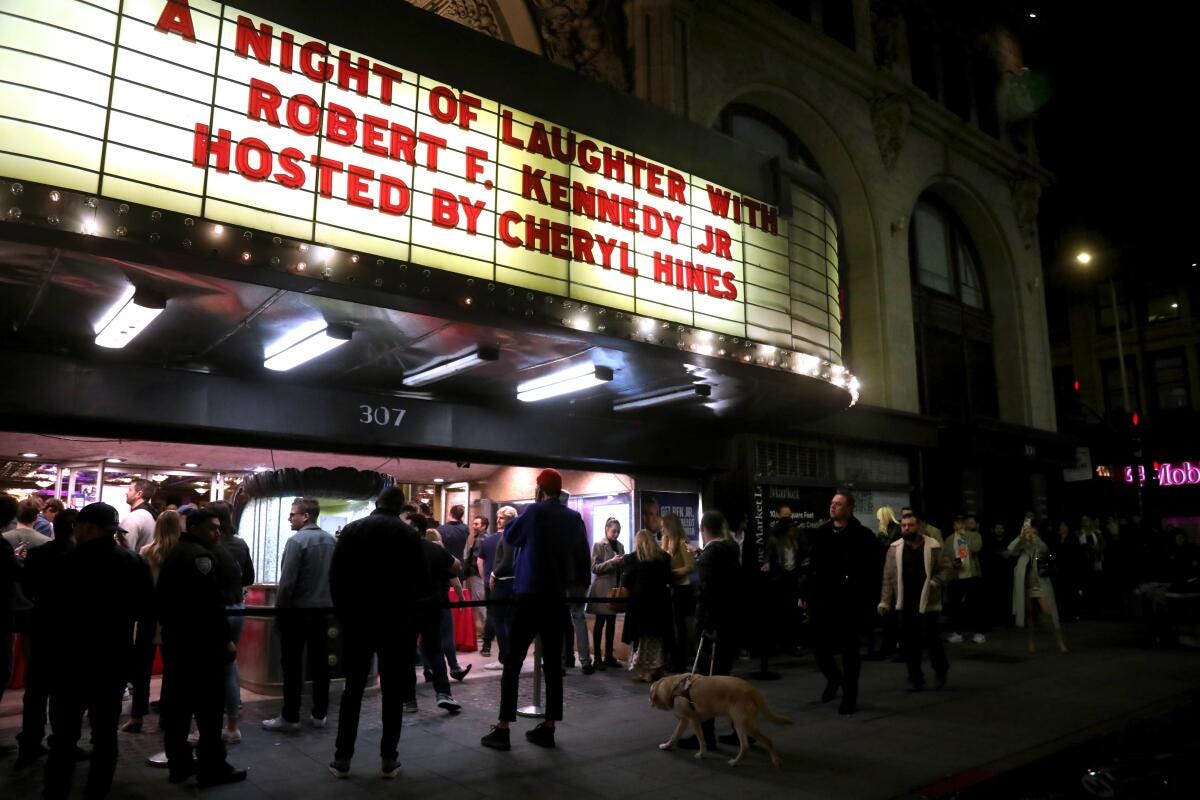
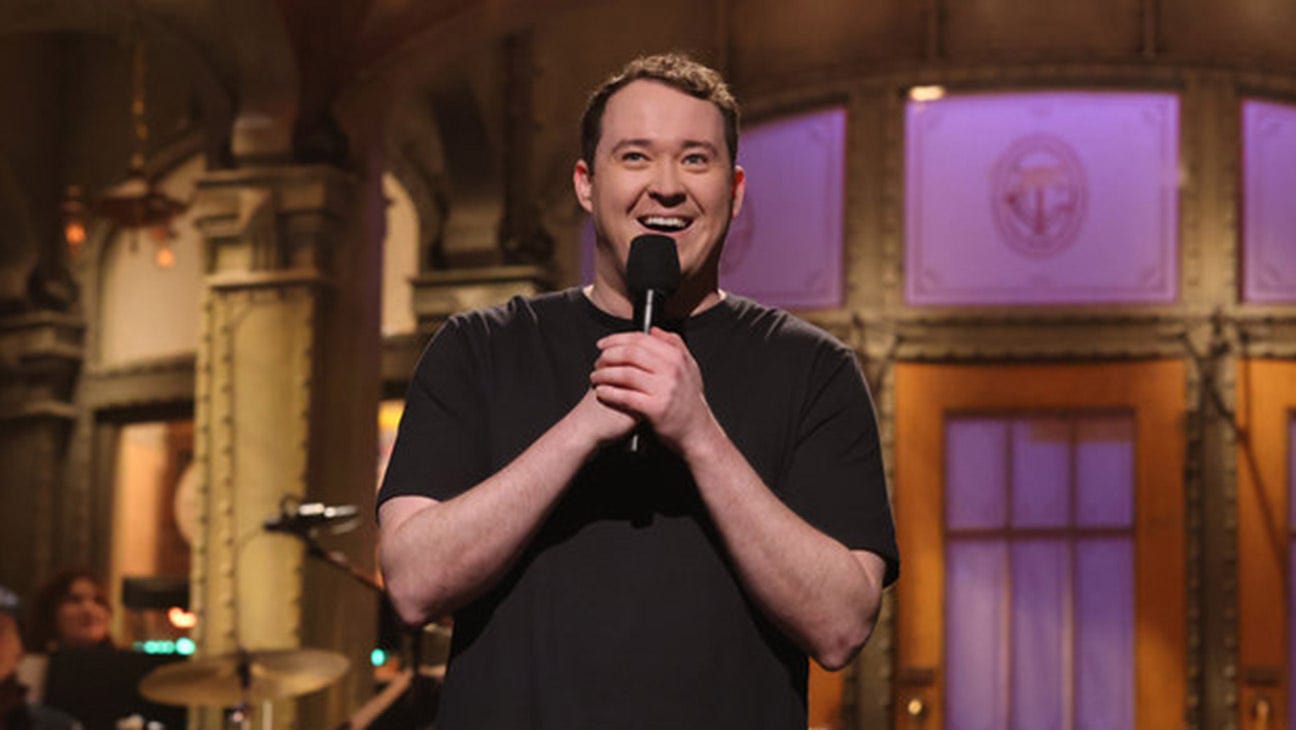
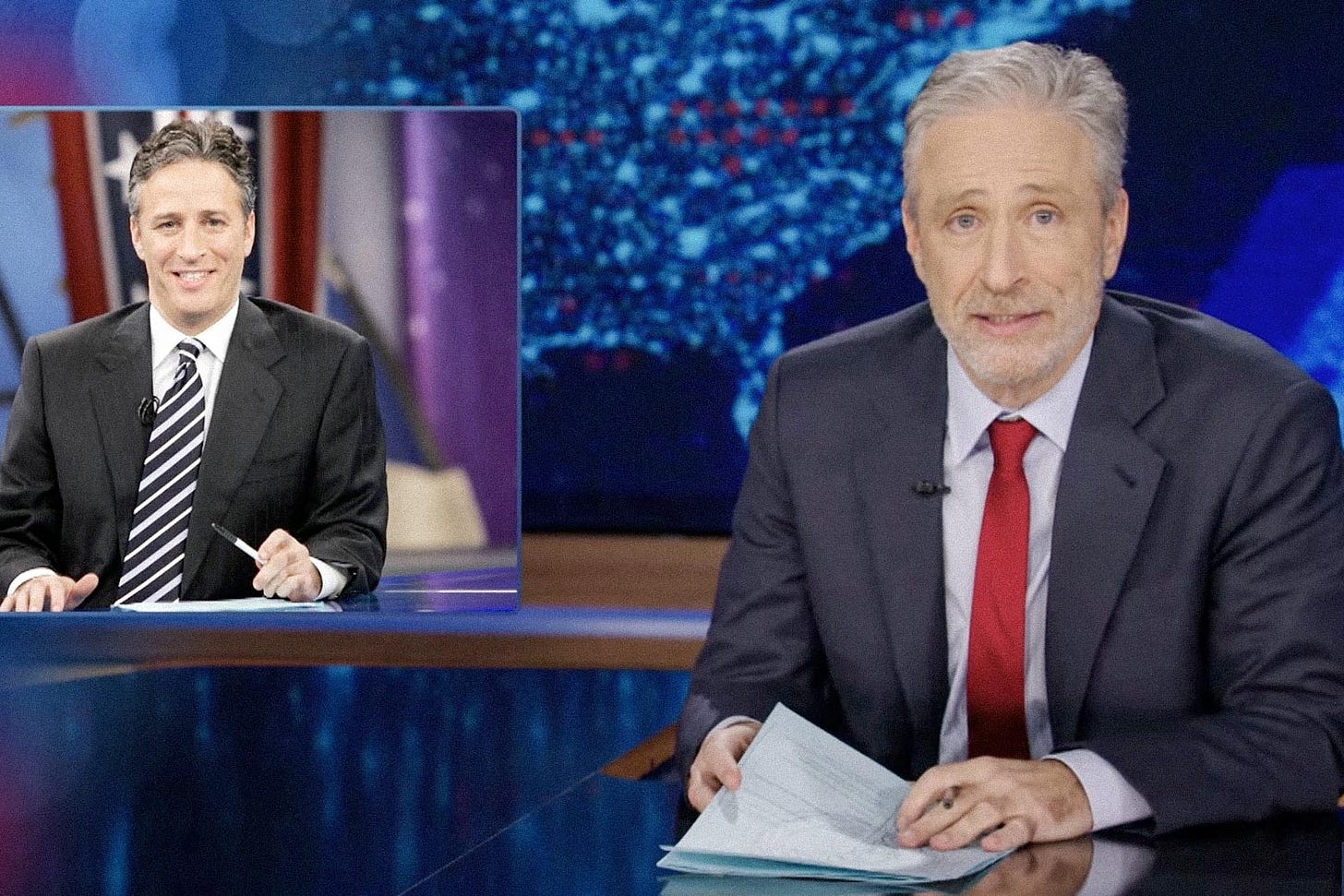


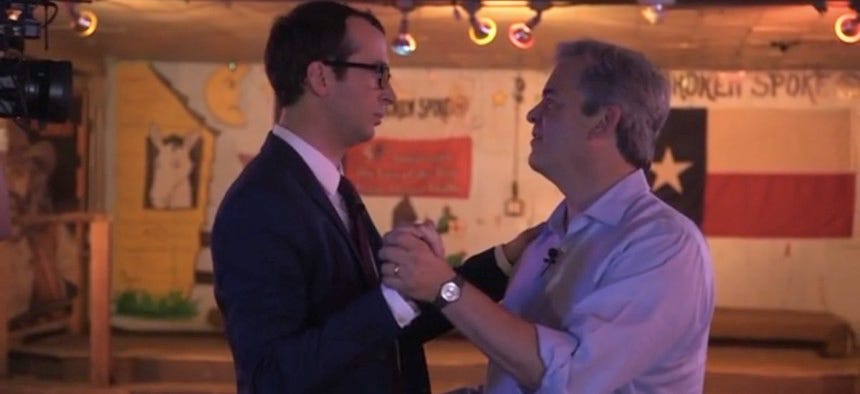
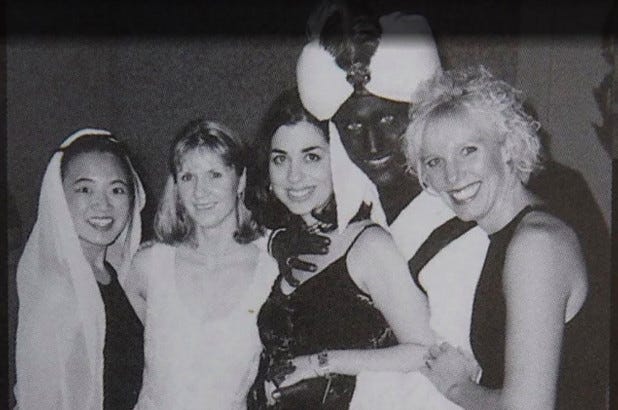
This is a really interesting article. I have to admit I have not thought much about the issues you raise, but I can agree comedy is dead, due to the censorship issue of people not wanting to offend anyone, then again, there are the supposed comedians who are just shock jock material and their comedy is NOT funny, it's just stupid and vulgar and mean. I personally love Dave Chapelle, but that's just me. I feel like he's a philosopher of modern times, able to make fun at lots of things and people but a man with a truly generous heart...
Garbage article. Don Rickles called from his grave…”you’re all cunts” stfu